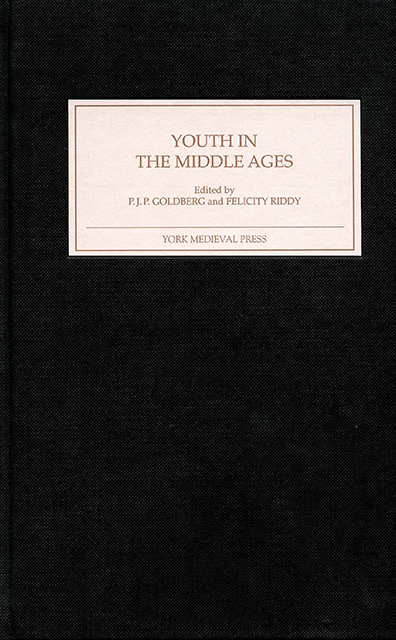Book contents
- Frontmatter
- Contents
- List of Contributors
- Introduction: After Ariès
- Childhood and Youth in the Early Middle Ages
- Jewish Society under Pressure: The Concept of Childhood
- Desiring Virgins: Maidens, Martyrs and Femininity in Late Medieval England
- Out of the Mouths of Babes: Authority in Pearl and in Narratives of the Child King Richard
- A Safe-Haven for Children? The Early Humiliati and Provision for Children
- Migration, Youth and Gender in Later Medieval England
- Good Advice on Leaving Home in the Romances
- ‘Youth on the Prow’: Three Young Kings in the Late Viking Age
- Index
- York Medieval Press: Publications
Childhood and Youth in the Early Middle Ages
Published online by Cambridge University Press: 25 March 2023
- Frontmatter
- Contents
- List of Contributors
- Introduction: After Ariès
- Childhood and Youth in the Early Middle Ages
- Jewish Society under Pressure: The Concept of Childhood
- Desiring Virgins: Maidens, Martyrs and Femininity in Late Medieval England
- Out of the Mouths of Babes: Authority in Pearl and in Narratives of the Child King Richard
- A Safe-Haven for Children? The Early Humiliati and Provision for Children
- Migration, Youth and Gender in Later Medieval England
- Good Advice on Leaving Home in the Romances
- ‘Youth on the Prow’: Three Young Kings in the Late Viking Age
- Index
- York Medieval Press: Publications
Summary
This article was originally entitled ‘Writing the History of Youth in the Early Middle Ages’. My concern was to think about the potentiality of the documentary source material for the study of youth: narrative historical sources, hagiography, the legal material and so on. I found it in practice impossible to write about youth without writing about childhood, and in the end I found myself concentrating on the writings of Gregory of Tours: a proper title for this article is thus either ‘Childhood and Youth in Merovingian Gaul’ or, more honestly, ‘Childhood and Youth in Gregory of Tours’. I concentrate on Gregory not just because I am working on a monograph on this author, but also because, in the 880 printed pages in the Monumenta Germaniae Historica edition, he presents us with a very large body of material, covering both the historical and hagiographical genres, which also includes probably more autobiographical material than we have extant from anyone else in the early Middle Ages – not expressed with the sophistication of Augustine of Hippo’s Confessions, perhaps, but rich and interesting despite that, or because of that. The advantage of having such a body of material from one person is that, although it might only be one man’s view of the subject, it may at least provide some consistency of terminology and approach. Understanding one man’s view of childhood and youth would, after all, be a start, given the startling lack of research into this topic by early medieval historians, and given its inherent problems.
The first question to ask, of course, is what questions ought we to be asking? What are the issues that we should like to resolve about childhood and youth in the early Middle Ages? We should naturally like to know if our own concept of ‘youth’ – which is itself highly subjective, extremely fluid at the edges and not very stable at the middle – had any corresponding concept in the period, or whether people in the early Middle Ages used quite different categories.We should like to know how adults treated young people, and vice versa. We should like to know about adult understanding of child and youth behaviour, and the extent of adult tolerance of it.
- Type
- Chapter
- Information
- Youth in the Middle Ages , pp. 11 - 24Publisher: Boydell & BrewerPrint publication year: 2002



